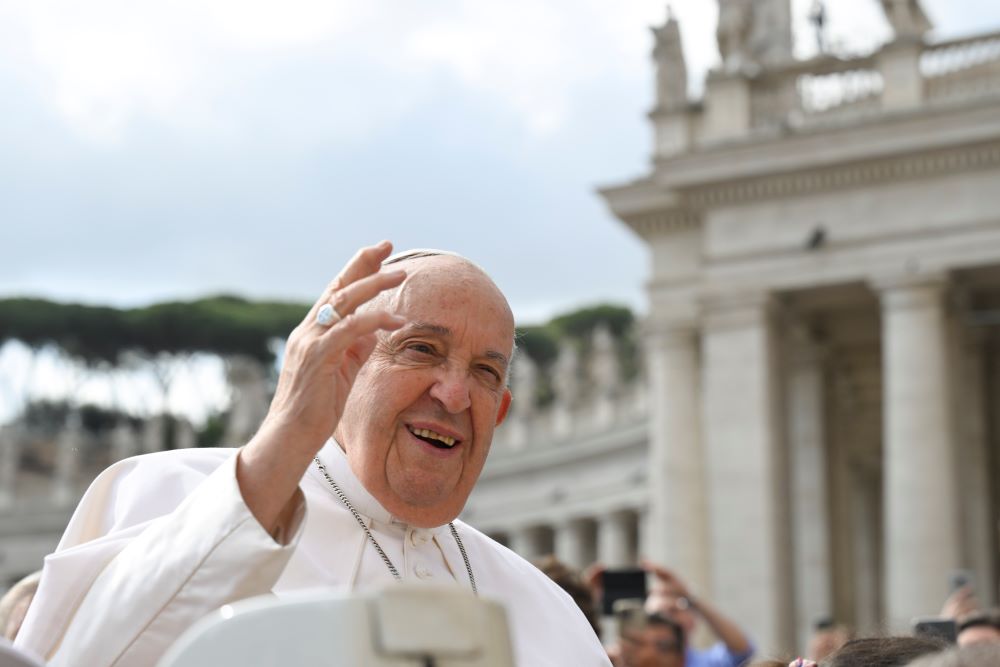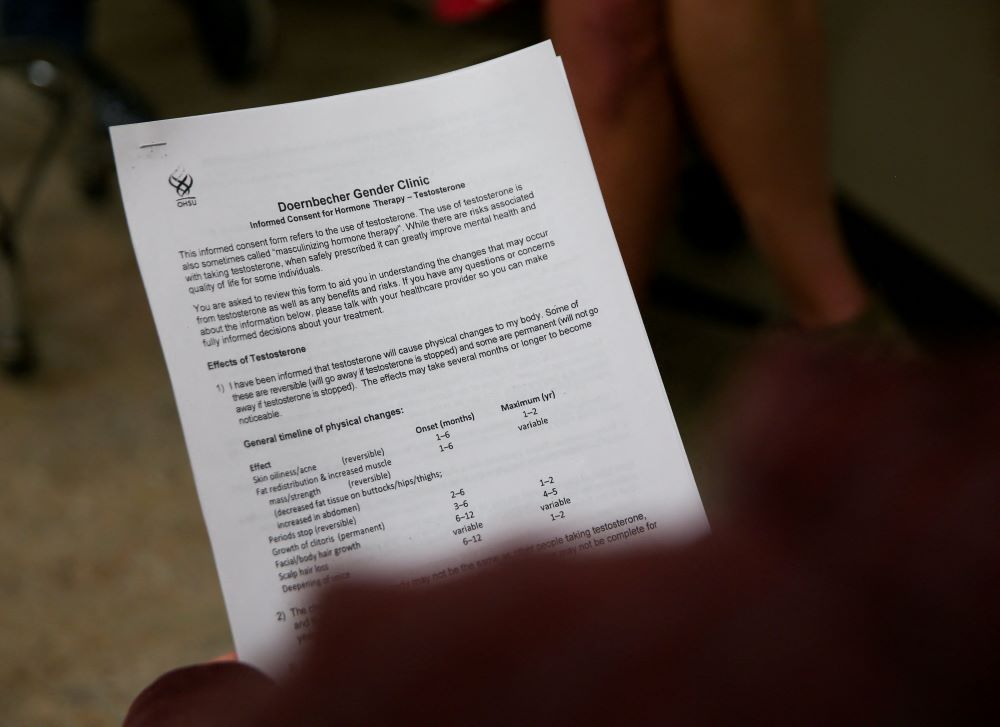
Pope Francis waves to visitors in St. Peter's Square while riding the popemobile before his general audience at the Vatican May 22. (CNS/Pablo Esparza)
It's been an astounding couple weeks. It feels like we've been watching in hyper speed the long journey of the Catholic Church, as it tries to figure out its future. Does it move forward, with open doors and faces, or make a sharp turn back to certain "old ways" that close doors and confine hearts?
First, there was a news-making commencement address at the small, very conservative Benedictine College in Kansas by Harrison Butker of the Kansas City Chiefs. Butker dismissed as "diabolical lies" the idea that women should pursue careers and encouraged men in the audience to fight against "cultural emasculation." He criticized priests for "misleading their flocks" and caring more about their "hobbies" and "photos with their dogs."
Benedictine College in Atchison, Kansas, is sponsored by the monks of St. Benedict’s Abbey and the sisters of Mount St. Scholastica Monastery. (OSV News/Megan Marley)
For young Catholics and non-Catholics, this seemed to send a message: These are the topics the "real" church cares about. This is the real church speaking the only truth.
And that speech came shortly after the Associated Press singled out Benedictine College as proof that substantial numbers of Catholics are in fact taking a "step back in time" and reaching in reverse for the old ways of the church.
To us at NCR, that just doesn't make sense. In a recent editorial, we asked how many American Catholics really think this form of education — highlighted by that kind of commencement address — is the face we want to present to ourselves, our children and our world.
Pope Francis seems to be wondering the same thing. On a special edition of "60 Minutes," CBS News anchor Norah O'Donnell asked the pope about conservative U.S. bishops who "oppose your new efforts to revisit teachings and traditions." Francis called that kind of conservatism in the church a "suicidal attitude." It's good to honor tradition, he said, but wrong "to be closed up inside a dogmatic box."
Yet, in the same CBS interview, Francis himself seemed to walk back from an issue he once appeared to be considering closely — ordained women deacons. "For a little girl growing up Catholic today, will she ever have the opportunity to be a deacon and participate as a clergy member in the church?" O'Donnell asked the pontiff. "No," was his unhesitant reply. O'Donnell came around to the topic again, as if to make sure. And again, the answer was, "If it is deacons with Holy Orders, no."
As NCR Vatican correspondent Christopher White reported, this same pope has set up two commissions to examine the issue and made it a key topic throughout the two-year long synodal process. Why bother, only to pull the rug out from under women in a televised interview?

A person holds a consent form for testosterone therapy during an appointment at Oregon Health & Science University's Doernbecher Gender Clinic in Portland, Oregon, May 10, 2022. (OSV News/Reuters/Lindsey Wasson)
Another issue related to gender has also dominated church discussions and our recent reporting. NCR staff reporter Katie Collins Scott conducted an urgent investigation into two conservative groups that wield enormous influence over U.S. Catholic transgender policy: The Cardinal Newman Society and the Person and Identity Project. Both often work out of the limelight, seeking to persuade dioceses and Catholic universities to create policies that, as Scott reports, are even more conservative than the Vatican's most recent doctrinal statement.
That's a lot of news — in a very compressed amount of time — about the direction of the church. And, for better or worse, no one expects this pace to slow down any time soon. This tug of war about the church's future — and America's — will only get more pronounced as the year goes on: Our political conventions are this summer, along with a big National Eucharistic Congress gathering in Indianapolis. In October, the second synod on synodality in Rome will consider key questions about Catholicism's path forward, revisiting many questions raised — but left unanswered — in the first synod last October.
And, as we are all aware, that event in Rome will be quickly followed by Election Day here in the U.S. in November — where the stakes once again are enormously high, for the nation as a whole, and for U.S. Catholicism in particular.
Hovering over all this is the reality that Francis is most likely approaching the final chapters of his groundbreaking papacy. There is only so much time left to set the church on the path he envisions. Will his remaining time be enough?
Advertisement
These questions and concerns make the current moment so critical. We at NCR — independent journalists who care about where the church is going — find ourselves in the right place at the right time, with a front row seat to history. Our readers are there with us, witnesses to an unfolding drama, as we cover every important step throughout this crucial time.
Plain and simple, we could not do this important mission without you. NCR has an incredibly loyal and engaged readership; we have thousands of donors who give generously every year to keep this unique nonprofit news organization going. You've been doing that for 60 years now — carrying us with your support into this pivotal moment.
The best way we know to thank you is to keep our promise to you, with reliable reporting you know you can count on — now more than ever.
Editor's note: Please continue to support us as we head into a busy six-month period, covering news here and at the Vatican. Go to NCRonline.org/donate or call 816.968.2233. Thank you!





